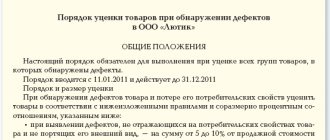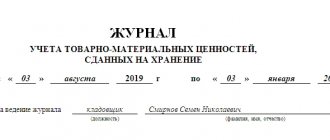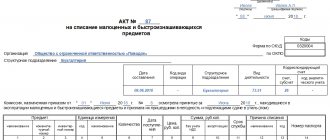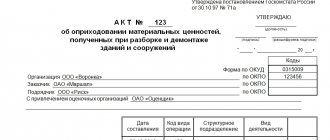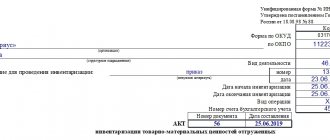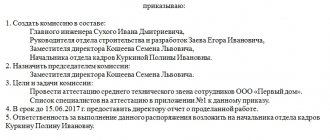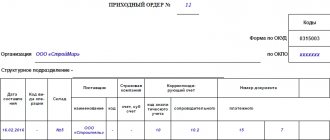How to arrange a free transfer of goods
Each operation in the course of business activities, including the gratuitous transfer of goods, is confirmed by primary accounting documents.
They must contain natural and monetary measures and all established mandatory details (Article 9 of the Law “On Accounting”). One of the required details is the date of compilation.
Since gratuitous transfer refers to transactions subject to VAT, you will determine the moment the tax base arises by the date of preparation of the primary accounting document (clause 1 of Article 167 of the Tax Code of the Russian Federation).
Which form you use as a primary form, write down in your accounting policy. If you are transferring goods, then this may be an invoice in the form No. TORG-12.
Features of the gratuitous transfer of property
The first feature of accounting for such property is that in connection with the payment of VAT and non-payment of income tax, the organization that transferred the property has permanent tax differences, which later turn into permanent tax liabilities. They are reflected in accounting by posting D99/Profit K68/Calculations for taxes and fees.
When applying the simplified taxation regime, the following feature appears. Due to the fact that gratuitous transfer does not bring the taxpayer any income, then when applying the simplified form with the object “income”, there is nothing to pay tax on. If the taxpayer has an “income minus expenses” object, then only the amount of depreciation accrued before the transfer can be accepted as expenses. From the moment the property is transferred to another legal entity, the simplifier should not include depreciation in costs until the property is returned back. Therefore, for those who apply the 15% rate, it is easier to transfer property at least for a small fee. This will allow expenses to be taken into account.
As we can see, the gratuitous transfer of property is reflected in the organization’s accounting. No matter how strange it may sound, when transferring property free of charge, the concept of “free sale” is used. This is due to the fact that the organization that transferred the property has to charge and pay VAT to the budget. The company that receives the property can exercise its right and accept a VAT deduction from the cost of such property. No income tax is paid on gratuitous transfers.
How to issue an invoice
Since the gratuitous transfer of goods is considered a sale, you will have to issue an invoice in accordance with the general procedure (clause 3 of Article 168 of the Tax Code of the Russian Federation).
Read in the berator “Practical Encyclopedia of an Accountant”
Gratuitous transfer - a special case of implementation
Fill out the invoice in one copy. Two are not needed, since the recipient of the gratuitous goods does not deduct VAT (see letter of the Ministry of Finance dated December 13, 2016 No. 03-03-05/74496).
In the invoice, indicate the market value of the transferred goods and the amount of VAT calculated for payment to the budget.
The market price is the value specified in the contract if the parties are not interdependent (clause 1 of Article 105.3, clause 2 of Article 154 of the Tax Code of the Russian Federation). That is, it is the price at which you sold similar goods to other unrelated parties in the ordinary course of your business.
An invoice must be issued within 5 days from the date of shipment. If the moment of shipment is recorded in the invoice, then within 5 days from the date of its issuance, including the date of registration.
Read in the berator “Practical Encyclopedia of an Accountant”
How to fill out an invoice
Documentation of property transfer
If the value of the transferred property is higher than the established limit, then an agreement must be drawn up. This can be either a gift agreement (if the property is transferred to a non-profit organization or ownership is transferred to the receiving party) or an agreement for gratuitous use.
If a gift agreement is concluded, the organization becomes the owner of certain property that it accepted as a gift. Such an agreement does not provide for the transfer of anything in return.
In the case when property is transferred between commercial companies and the value of the property allows, then a free use agreement is concluded. This means that the transferring party remains the owner of the property, and the property is transferred for a certain time. Upon expiration of the agreed period and at the request of the transferring party, the property must be returned back in its proper form . An option is possible when the property is transferred for long-term use, for example, until the organization is liquidated. The recipient can use such items as his own property.
The contract for the transfer of property is usually drawn up by a notary. To do this, you must provide an application, constituent documents, property documents and passports of representatives of organizations.
Charity
If you transfer goods as part of charity (except for excisable goods), then such sales are exempt from VAT (subclause 12, clause 3, article 149 of the Tax Code of the Russian Federation).
Charity is the voluntary activity of individuals in the transfer of property to citizens or legal entities free of charge or on preferential terms (Article 1 of the Federal Law of August 11, 1995 No. 135-FZ “On Charitable Activities and Volunteering (Volunteering)”).
Exemption from VAT will have to be confirmed by the following documents:
- an agreement or contract on the free transfer of goods;
- act of acceptance and transfer.
Agreement on gratuitous transfer (donation) of material assets
Agreement on gratuitous transfer (donation) of material assets
[enter as required] [date, month, year]
[Full name of the legal entity], hereinafter referred to as “Donor”, represented by [position of manager, full name], acting on the basis of [specify document certifying authority], on the one hand, and [F. I.O./full name of the citizen, medical, educational institution, social security institution and other similar institution, charitable, scientific and educational institution, foundation, museum and other cultural institution, public and religious organization, other non-profit organization to which material assets are transferred ], represented by [position of manager, full name], acting on the basis of [insert document certifying authority], hereinafter referred to as the “Done”, on the other hand, collectively referred to as the “Parties”, have entered into this agreement as follows:
1. Under this agreement, the Donor undertakes, before [date, month, year], to transfer free of charge into the ownership of the Donee the material assets, list, units of measurement, quantity and cost of which are indicated in the specification attached to this agreement and which is an integral part of it.
2. The total cost of material assets to be transferred is [value] rubles.
3. Material assets are transferred to the Done for their use in [describe the use of this property for a specific purpose, for a specific generally useful purpose].
4. The transfer of material assets to the Donee is formalized by a transfer and acceptance certificate, which is signed by representatives of the Parties.
5. Rights to material assets subject to transfer under this agreement pass to the Donee after signing the transfer and acceptance certificate.
6. The donee accepts the donation and undertakes to use it in accordance with the purposes and conditions specified in clause 3 of this Agreement.
7. If it is impossible to fulfill the obligation to use donated material assets in accordance with the instructions of the Donor due to changed circumstances, the donated material assets may be used for another purpose with the written consent of the Donor. In case of [death of a citizen-donor/liquidation of a legal entity] - by court decision.
8. The use of donated material assets not in accordance with the purpose specified by the Donor or a change in this purpose in violation of clause 3 of the agreement gives the right to the Donor, his heirs or another legal successor to demand cancellation of the donation.
9. This agreement comes into force from the moment it is signed and is valid until the parties fully fulfill their obligations.
10. Changes and additions to the agreement are made in writing and signed by the Parties.
11. In all other respects that are not provided for in this agreement, the Parties are guided by the legislation of the Russian Federation.
12. This agreement is concluded between the Parties in two copies having equal legal force, one for each Party.
13. Addresses, details and signatures of the Parties.
Donor Donee
[fill in as needed] [fill in as needed]
[fill in as needed] [fill in as needed]
M.P.M.P.
Postings in accounting
The transferring party makes such entries in its accounting.
- Debit 91 subaccount other expenses Credit 41
- the cost of goods transferred free of charge is written off based on the invoice.
- VAT is charged on the free transfer of goods based on an invoice.
The gratuitous transfer of goods worth more than 3,000 rubles in relations between commercial organizations is prohibited (subclause 4, clause 1, article 575 of the Civil Code of the Russian Federation).
What does the legislation say about the gratuitous transfer of property?
The procedure is regulated by the Civil Code of the Russian Federation. In accordance with it, the gratuitous transfer of property means the transfer by one business entity to another of something without receiving reciprocal compensation. From a legal point of view, this implies a double interpretation, since a thing can be transferred both into ownership and for temporary use. In this case, the transfer will be a loan, since organizations do not have the right to give each other anything (clause 4, clause 1, article 575 of the Civil Code of the Russian Federation).
Before drawing up an agreement on the transfer of property for free use, entrepreneurs should familiarize themselves with the following articles of the Civil Code of the Russian Federation:
- Art. 423 (here is the definition of a gratuitous agreement between the parties);
- all articles of Chapter 36 (here we talk about the features of drawing up a loan agreement).
How can the gratuitous use of property result?
Letters from our readers often describe the following situation. An organization uses premises or other property owned by another company for free, either without concluding any agreement at all (for example, rent, etc.), or under a gratuitous use agreement (fixed or unlimited). I would like to warn you about the possible negative tax consequences of such use .
What will it cost you?
The fact is that the free use of property entails the receipt of non-operating income from the gratuitously received right to use the property <1>. This income is calculated by estimation according to Art. 40 Tax Code of the Russian Federation. And if you do not take it into account when calculating the tax base for income tax or tax under the simplified tax system <2>, then the tax authorities, having discovered this state of affairs, will do the following:
- additional income tax will be charged (tax paid in connection with the application of the simplified tax system) on the amount of such income, calculated based on the prices at which similar property is rented out <3>; — the corresponding penalties will be charged <4>; — will be fined for failure to pay income tax (“simplified” tax) in the amount of 20% of the amount of unpaid tax <5>.
Attention! Anyone who provides their property for free use may also have problems. Firstly, he does not have the right to charge depreciation on such property <6>, and secondly, he may be charged additional VAT on the market rental value of similar property <7>.
This was confirmed to us by the Federal Tax Service of Russia.
FROM AUTHENTIC SOURCES
MELNICHENKO ANATOLY NIKOLAEVICH - State Councilor of the Russian Federation, 1st class
“When conducting on-site audits, tax authorities pay special attention to the legal basis for the taxpayer’s use of property, property rights, works and services of other persons in his activities.
If an organization has received from another organization the right to use its property (for example, an office) free of charge, then in this case it is obliged to include in the tax base the amount of non-operating income determined on the basis of market prices for the rental of identical property excluding VAT. This position is also shared by the Presidium of the Supreme Arbitration Court of the Russian Federation <8>.”
All of the above consequences will also occur when you received the right to use the property free of charge from your founder, whose share in your authorized capital is more than 50% <9>. Indeed, for tax purposes, income in the form of property received free of charge from the founder, and not property rights <10>, is not taken into account.
The only ones who should not take into account gratuitously received property rights as income for profit tax purposes are non-profit organizations that use state and municipal property free of charge to conduct statutory activities <11>.
When to recognize “gratuitous” income
As for the date of recognition of income for the gratuitous use of property, for organizations using the accrual method, everything is more or less clear: they must recognize such income during the entire period of use of the property at the end of each quarter (month) <12>. By the way, many simplifiers do not want to recognize income in the form of a property right received free of charge, since they actually do not receive any money and the moment of recognition of income in such a situation is not determined.
This position is wrong. After all, income is not only the actual receipt of money, but also the receipt of other property or property rights <13>. Moreover, non-operating income for simplifiers is taken into account in the same manner as for organizations applying the general taxation regime <14>. And for the latter, the property rights received free of charge are directly listed among their income. If we speak the language of economics, then the income (economic benefit) from the free use of property consists of the saved money that the simplifier would have paid if he had used the property for a fee.
And here is what the Federal Tax Service told us about the date of recognition of income by simplifiers for the gratuitous use of property.
FROM AUTHENTIC SOURCES
MELNICHENKO ANATOLY NIKOLAEVICH, State Advisor of the Russian Federation, 1st class “For taxpayers using the cash method, the date of receipt of income in the form of a gratuitously received right to use property is: <or> the date of signing of documents confirming the transfer of property rights; <or> the day of actual receipt of property rights to gratuitous use of property.”
It turns out that if there is a document that indicates for what period the property is transferred, then you need to immediately take into account the income for the entire period of use of the property. If there is no such document, then income must be determined in each reporting period based on the rental cost of similar property.
How can you mitigate unpleasant consequences?
It turns out that when using property free of charge, it is better not to have any documents at all, from which it would be clear how long you have been using this property. In this case, you will at least be able to tell the tax authorities that “you just moved to this office a week ago.” Thus, the taxable income imputed to you will be small and you can get off with what is called a small loss. But keep in mind that the tax office can prove the opposite, namely that you have been using the premises for a long time. Inspectors may interview your neighbors in the office building, or you could easily be given away by, for example, an old newspaper advertisement with your address. And then additional taxes and other troubles cannot be avoided.
But even in this case, it’s too early to give up. You have many chances to challenge in court the correctness of the tax authorities’ determination of the market rental price for similar property, on the basis of which they determine the income received <15>. The fact is that they are not often able to find identical or homogeneous objects to compare prices, especially if they are real estate. Legal disputes on this issue that the Federal Tax Service would win are rare. And even then this happens when the taxpayer does not try to challenge the correctness of the tax authorities’ determination of the market price <16>.
WARN YOUR MANAGER
If the tax authorities become aware that your company is using someone else’s property for free, they will certainly charge additional taxes on the money saved on rent, and will also fine your organization.
* * *
So, gratuitous use of property is akin to free cheese, which, as you know, only comes in a mousetrap. This may lead to additional tax risks. Therefore, before you rejoice at the opportunity not to pay, for example, for the premises you occupy, adequately assess all the possible negative consequences of such a situation. Still, it is safer to conclude a lease agreement, even with a small rent, which you will include in expenses, and sleep peacefully than to flinch from every call from the Federal Tax Service.
——————————- <1> clause 8 of Art. 250 of the Tax Code of the Russian Federation, Letters of the Ministry of Finance of Russia dated December 11, 2009 N 03-03-06/1/804, dated 02/04/2008 N 03-03-06/1/77 <2> Letter of the Ministry of Finance of Russia dated October 31, 2008 N 03-11 -04/2/163; Resolution of the Federal Antimonopoly Service of the Eastern Military District dated July 29, 2008 N A29-9662/2007; FAS SZO 01.10.2008 N A44-96/2008; FAS North Caucasus Region dated October 22, 2008 N F08-6323/2008 <3> clause 8 of Art. 250, paragraph 1, art. 346.15, paragraph 1 of Art. 39, paragraph 3, art. 40 Tax Code of the Russian Federation <4> Art. 75 Tax Code of the Russian Federation <5> clause 1 art. 122 Tax Code of the Russian Federation <6> clause 3 art. 256 Tax Code of the Russian Federation; Letter of the Federal Tax Service of Russia for Moscow dated October 31, 2007 N 20-12/104582 <7> sub. 1 clause 1 art. 146, paragraph 2 of Art. 154, art. 40 Tax Code of the Russian Federation; Letter of the Ministry of Finance of Russia dated 05.05.2009 N 03-07-11/133; Resolution of the Federal Antimonopoly Service of the Eastern Military District dated 02/18/2008 N A31-567/2007-15 <8> clause 2 of the Information Letter of the Presidium of the Supreme Arbitration Court of the Russian Federation dated 12/22/2005 N 98 <9> Letters of the Ministry of Finance of Russia dated 03/14/2008 N 03-05-05-02 /12, dated January 24, 2007 N 03-11-05/10 <10> sub. 11 clause 1 art. 251 Tax Code of the Russian Federation <11> subp. 16 clause 2 art. 251 Tax Code of the Russian Federation; Letter of the Ministry of Finance of Russia dated March 19, 2010 N 03-03-06/4/24 <12> clause 1 art. 271, art. 285 Tax Code of the Russian Federation <13> clause 2 art. 272, paragraph 1, art. 346.17 Tax Code of the Russian Federation <14> clause 1 art. 346.15 of the Tax Code of the Russian Federation <15> see, for example, Resolution of the Federal Antimonopoly Service of the Eastern Military District dated July 29, 2008 N A29-9662/2007; FAS SZO dated 01.10.2009 N A42-7203/2008 <16> see, for example, Resolution of the FAS SZO dated 31.03.2009 N A33-4100/08-F02-1119/09
First published in the journal "Glavnaya Ledger" N 08, 2010
Hello Guest! Offer from "Clerk"
Online professional retraining “Accountant on the simplified tax system” with a diploma for 250 academic hours . Learn everything new to avoid mistakes. Online training for 2 months, the stream starts on March 1.
Sign up
Gratuitous transfer or donation
An organization, while carrying out its activities, can accept from other organizations or transfer to them property belonging to the company, without expecting any reciprocal steps in return, that is, free of charge . This is expressly permitted by Art. 572 of the Civil Code of the Russian Federation.
Once the property has been donated, the organization receiving it does not in any way assume the following obligations.
- This or that form of payment for the received property.
- Counter provision of services, performance of work, reciprocal property barter.
A gift , in contrast to a gratuitous transfer, is the provision of property or money in an amount not exceeding 3 thousand rubles. and does not require documentation.
NOTE! From the point of view of the Tax Code, a transfer, even gratuitous, is a transfer of ownership of property from one legal entity to another, that is, the same implementation.
Free loan agreement
Gratuitousness in terms of credit legal relations between legal entities can be understood as:
1. Provision by one legal entity to another of a loan without interest (or subject to subsequent forgiveness of interest).
2. Providing a loan by one legal entity to another with its subsequent complete write-off.
It is important that both types of legal relations do not include agreements that can be qualified as gift agreements during a tax audit. In this sense, the Federal Tax Service will have the least number of questions regarding the loan agreement, which was initially concluded without interest.
But there will be noticeably more questions if the interest or the debt as a whole is forgiven by the lender (through the conclusion of a separate agreement). If the parties cannot prove that the donation did not take place, then such an agreement may be declared invalid (clause 3 of information letter No. 104).
You can argue for the lack of intention to reward the counterparty when writing off a debt by reflecting in the loan (interest) forgiveness agreement the desire to forgive the debt based on considerations of benefit. It may consist in maintaining a trusting relationship with the counterparty and the opportunity to continue cooperation with him subsequently.
These are the main types of gratuitous agreements between legal entities. Despite their differences, it would be legitimate to identify a number of generalized features that characterize all the types of agreements considered.
What are the general characteristics of a gratuitous contract?
We can talk about such signs as:
1. Absence (in some cases) in the contract of provisions providing for strict liability of the parties for failure to fulfill their obligations.
Actually, such provisions may not be included in the contract if the parties do not consider them significant (clause 1 of Article 432 of the Civil Code of the Russian Federation).
Or, on the contrary, it must be included if the provisions of the contract need to show that the party performing the duties free of charge does so in order to obtain benefits. And if the other party violates its obligations, the first will apply strict sanctions against it - as a tool to compensate for the costs incurred. Such costs may be expressed, for example, in transportation costs for the transportation of gratuitously transferred property, which the other party suddenly refused to accept.
2. Superficial regulation of securing obligations (use of collateral, prepayment, financial guarantees).
But in some cases such regulation cannot be avoided, for example, if a gratuitous loan agreement is drawn up.
It is noteworthy that a gratuitous civil law contract can be drawn up outside the jurisdiction of the Civil Code of the Russian Federation. Let's study this nuance in more detail.
